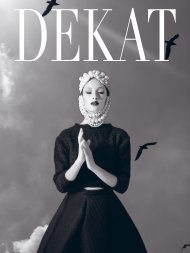DEKAT DIGITAL 2019 - 2020
DEKAT Magazine is the custodian of Afrikaans Culture. Well known for exceptional photography and design, the 2022 luxury edition will delight you. You will find topical lead articles, lifestyle articles focusing on art, culture, design and décor, motoring, food and wine and travel. In addition, we find hidden stories, meet extraordinary people and share divine recipes with you. The 320-page book is a unique window into the lives of the Bohemians and the Eccentrics living on the Southern tip of Africa.
DEKAT Magazine is the custodian of Afrikaans Culture. Well known for exceptional photography and design, the 2022 luxury edition will delight you. You will find topical lead articles, lifestyle articles focusing on art, culture, design and décor, motoring, food and wine and travel. In addition, we find hidden stories, meet extraordinary people and share divine recipes with you.
The 320-page book is a unique window into the lives of the Bohemians and the Eccentrics living on the Southern tip of Africa.
You also want an ePaper? Increase the reach of your titles
YUMPU automatically turns print PDFs into web optimized ePapers that Google loves.
Queen Elizabeth displayed a similar healthy dose of social intelligence during a phone call to Madiba to<br />
congratulate him on his birthday. According to his widow, Graça Machel, she heard her husband address the<br />
person on the other side of the phone as ‘Elizabeth’. When she learnt it was none other than the Queen of<br />
England on the line, she was quite astounded that he had not called her Your Royal Highness. “But she called<br />
me Nelson,” he explained in his amicable manner. As more pleasantries were exchanged before the call ended,<br />
clearly the Queen took no offence that Madiba had not observed the required protocol.<br />
DIFFERENT SETS OF PROTOCOLS AND ETIQUETTE<br />
While many may think that in this ‘modern’ day and age etiquette and protocol have become outdated, this is not<br />
actually the case, Louw notes. “The terminology may be rather passé for the younger generation, but the need to apply<br />
social and business intelligence certainly isn’t, particularly in Africa with its diverse nations and cultures,” he notes.<br />
“On the African continent alone there are 54 countries, each with its own set of protocols and etiquette. In addition,<br />
in South Africa there are a number of subcultures that also need to be taken into account.<br />
eye contact, for instance. While the continental norm of consistent<br />
eye contact in a one-on-one conversation or meeting may vary from<br />
55% to 75%, in many African countries (like Malawi, Kenya, Tanzania,<br />
Uganda and Ghana) and countries in the Far East (Japan, China and<br />
Korea), eye contact is under 55%, even 45%, as this is the way you<br />
show respect for senior or older people.<br />
“Similarly, when you meet a person and shake hands, the duration of eye<br />
contact may vary from country to country, and situation to situation. In<br />
“Take<br />
South Africa and internationally, eye contact in a meet-and-greet situation<br />
is normally about three seconds so that you can repeat the person’s name (people love hearing the sound of their own<br />
names), and register the colour of their eyes. But again, in African countries and some countries in the Far East, eye<br />
contact in such instances may be shorter as a sign of respect and acknowledgement,” Louw explains.<br />
When you’re unfamiliar with a person’s language or culture, you can simply place your hand on your heart to show<br />
appreciation or respect, or to pay them a compliment. “This token of goodwill to convey your thanks and express<br />
acknowledgement is ideal, particularly in the services industry globally, and more often than not it prompts excellent<br />
service,” Louw reckons.<br />
Because of his involvement in African countries and his intimate knowledge of cross-cultural training, earlier this year<br />
Louw was invited to present a workshop at the National Education Summit in Washington DC. “As a result of my<br />
training experience in sub-Saharan Africa, I specially titled it Africa: One Size Does Not Fit All. You can have all these<br />
rules on protocol and etiquette, but if you are not aware of – and respect – the cultural preferences of the person next<br />
to or opposite you, you will most likely fail as a brand ambassador.”<br />
173





